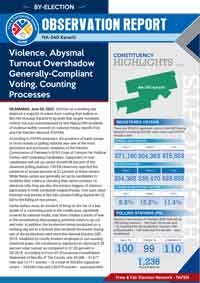ISLAMABAD, June 20, 2022: Election on a working day deterred a majority of voters from casting their ballots in NA-240 (Korangi Karachi-II) by-polls that largely remained orderly, but was overshadowed by two high-profile incidents of violence widely covered on national media, reports Free and Fair Election Network (FAFEN).
NA-240 Karachi By-Election: Party Camps Pose Problems
According to FAFEN observers, the presence of party camps in close vicinity of polling stations was one of the most persistent and prominent violations of the Election Commission of Pakistan’s (ECP) Code of Conduct for Political Parties and Contesting Candidates. Supporters of rival candidates had set up camps around 88 percent of the observed polling stations. FAFEN observers reported the presence of armed persons at 22 percent of these camps. While these camps are generally set up by candidates to facilitate their voters in checking their serial numbers on electoral rolls, they are also the primary triggers of violence particularly in hotly contested neighborhoods. One such clash between rival parties in NA-240 outside Polling Station No.52 led to the killing of one person.
Earlier before noon, an incident of firing on the car of a key leader of a contesting party in the Landhi area, repeatedly covered by national media, may have created a sense of fear in the constituency discouraging potential voters to go out and vote. In addition, the by-election being conducted on a working day led to a turnout that remained the lowest during any of the by-elections held since the General Election (GE) 2018. Inhabited by mostly workers employed in surrounding industrial areas, the constituency registered an abysmal 8.38 percent voter turnout as compared to 37.38 percent in GE-2018. According to Form-47 (Provisional Consolidated Statement of Results of The Count), only 44,388 – 31,677 men and 12,711 women – of a total of 529,855 registered voters – 294,385 men and 235,470 women – exercised their right to vote on June 16, 2022. As many as 440 ballots were excluded from the count, while the margin of victory between winner and runner-up was merely 64 votes.
NA-240 Karachi By-Election: Better Voting Process
FAFEN observers reported that the voting process remained largely compliant with the procedure provided in the Elections Act 2017, the Elections Rules 2017, and the ECP’s instructional handbooks. However, they reported some procedural irregularities at polling stations such as setting up of party camps outside the polling stations, missing or improperly placed secrecy screens at polling booths, and skipping out necessary voter verification steps, which indicate the need for greater investments in training as well as increased scrutiny of officials before their selection for election duties.
The by-election was compelled due to the death of Mr. Iqbal Muhammad Ali Khan, who had won this constituency on Muttahida Qaumi Movement Pakistan’s (MQMP) ticket by securing 61,165 (34 percent) of the polled votes during GE-2018, while the Tehreek-e-Labbaik Pakistan’s (TLP) Mr. Muhammad Asif was the runners-up bagging 30,535 (17 percent) of the polled votes. Seven political parties including MQMP, TLP, Grand Democratic Alliance (GDA), Mohajir Qaumi Movement Pakistan (MQM-P), Pakistan Muslim League (PML), Pak Sarzameen Party (PSP), and Pakistan People’s Party Parliamentarians (PPPP) fielded their candidates for the by-election, while 18 candidates contested independently.
Setting up of Polling Stations
The ECP had set up 309 polling stations – 100 male, 99 female and 110 combined. As many as 208 polling stations had more than 1,200 voters assigned to them, which was above the legally advisable limit under Section 59 (3) of the Elections Act, 2017. The election law had included a maximum limit of voters to be assigned at a polling station in the interest of smooth voting and ensuring that the polling stations do not get cramped and crowded with voters. The law requires the Returning Officers to document categorical reasons for assigning more voters than the permissible limit at any polling station.
The report is based on the observation of 247 polling booths at 67 polling stations spread across the constituency by a total of 18 non-partisan, trained, and duly accredited observers – eight men and ten women. This includes the observation of the counting process at 13 polling stations.
To download this report, click here




